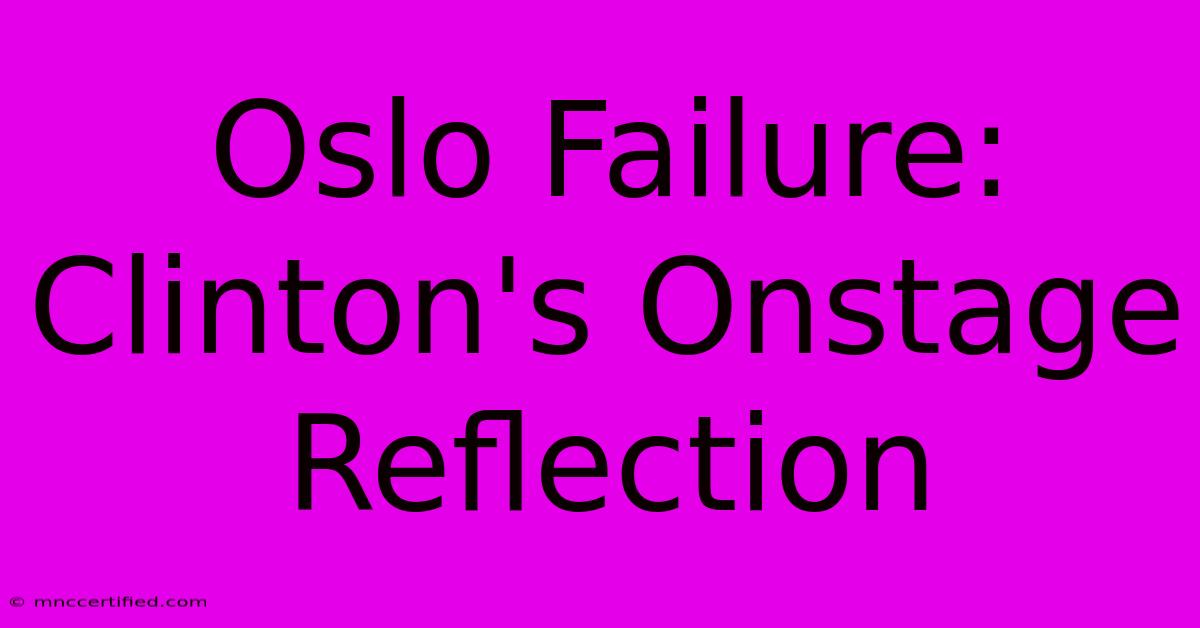Oslo Failure: Clinton's Onstage Reflection

Table of Contents
Oslo Failure: Clinton's Onstage Reflection – A Defining Moment
Hillary Clinton's infamous "Oslo Failure" speech, delivered during her 2008 presidential campaign, remains a significant moment in political history. While often overshadowed by other events, understanding its context, content, and lasting impact is crucial for anyone studying American politics and the dynamics of presidential campaigns. This article delves into the speech, analyzing its key aspects and its contribution to the larger narrative of Clinton's career.
The Context: A Campaign in Crisis?
By the time Clinton delivered her speech in Oslo, Norway, her presidential campaign was facing mounting challenges. She had initially been considered the frontrunner, but Barack Obama's momentum was undeniable. The Iowa caucuses and the New Hampshire primary had delivered significant setbacks, raising questions about her electability. The Oslo speech was presented as an attempt to reassert her candidacy and address concerns about her leadership. It was a calculated risk – a moment of vulnerability in an attempt to connect with voters on a deeper level.
Key Challenges Facing Clinton's Campaign:
- Obama's Rising Popularity: Obama's charismatic campaign was resonating strongly with voters, particularly younger demographics. Clinton needed to distinguish herself and address the perception that she was less relatable.
- Questions of Experience: While Clinton's experience was a strength, some argued it made her appear out of touch with the concerns of everyday Americans.
- The "Inevitability" Narrative: Early predictions of Clinton's victory had fostered a sense of entitlement among some of her supporters, creating a backlash when her momentum stalled.
The Speech: A Candid Assessment?
The speech itself was notable for its frankness. Clinton acknowledged her campaign's struggles and admitted to making mistakes. She didn't shy away from criticism and presented a self-reflective image, a departure from her usual polished persona. This vulnerability was both a strength and a weakness. While it resonated with some voters who appreciated her honesty, others criticized it as a sign of weakness or an indication that she couldn't handle the pressures of the presidency.
Key Themes of the Oslo Speech:
- Self-reflection and Accountability: Clinton took responsibility for her campaign's shortcomings, acknowledging areas where she could have improved.
- A Renewed Focus on Policy: The speech emphasized her policy positions and her vision for the country, attempting to shift the focus away from the campaign's internal struggles.
- A Call for Unity: Clinton appealed for unity within the Democratic party, recognizing the need to avoid fracturing the base ahead of the general election.
The Aftermath: Impact and Legacy
The Oslo speech didn't immediately turn the tide of the campaign. Obama continued his winning streak, but the speech is often cited as a pivotal moment in Clinton's evolution as a candidate. It marked a shift in her communication style, a willingness to be more open and vulnerable with voters. This approach would become a hallmark of her later campaigns and public appearances.
Long-Term Implications of the Oslo Speech:
- A Lesson in Campaign Strategy: The speech highlights the importance of adapting to changing circumstances and responding effectively to challenges in a presidential campaign.
- The Power of Vulnerability: Clinton's willingness to admit mistakes demonstrated a level of authenticity that connected with some voters, highlighting the potential benefits of vulnerability in political communication.
- A Precursor to Future Campaigns: The lessons learned from the Oslo speech likely informed her approach to future political endeavors, impacting her communication style and campaign strategies.
Conclusion: More Than Just a Speech
The Oslo Failure speech wasn't simply a campaign address; it was a reflection of a candidate grappling with adversity. While its immediate impact might be debated, its lasting significance lies in its contribution to understanding the complexities of presidential campaigns, the evolution of Hillary Clinton's political persona, and the power of vulnerability in political communication. Analyzing this moment provides invaluable insight into the strategic challenges and personal transformations inherent in the pursuit of the highest office in the land. Future research could explore comparative analyses with other high-profile campaign speeches and their long-term effects on candidate image and electoral success.

Thank you for visiting our website wich cover about Oslo Failure: Clinton's Onstage Reflection. We hope the information provided has been useful to you. Feel free to contact us if you have any questions or need further assistance. See you next time and dont miss to bookmark.
Featured Posts
-
Do You Sell Cars Jaguars Rebrand Fails
Nov 21, 2024
-
Megan Moroney New Artist Award
Nov 21, 2024
-
Brightway Insurance Phone Number
Nov 21, 2024
-
Farm Bureau Insurance Fort Wayne
Nov 21, 2024
-
Life Of Boston Insurance Company
Nov 21, 2024